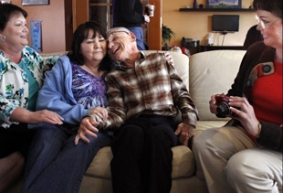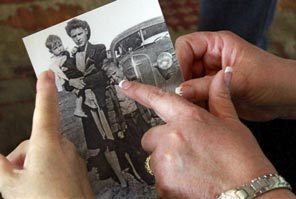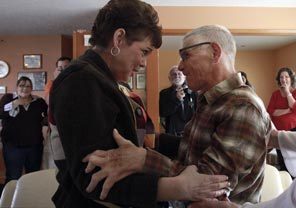
Jerry Wooliver meets sisters Julie Martin, left, Karen Newman and Janis MacPherson for the first time Saturday. Wooliver was born with cerebral palsy and was removed from his mother's home 61 years ago. Martin and MacPherson are twins.
Jerry Wooliver was a little boy in high-top baby shoes when he was taken from his mother and siblings and sent to a state institution. He never saw his family again, but for 61 years they lived on in hazy memories.
On Saturday, the 67-year-old Auburn man — who in 1951 was sent away because he had cerebral palsy — was reunited with part of his family in an emotional meeting at the Kent social-service organization where he works in the office.
"Oh my, I can't believe it!" said Karen Newman of Lacey as she walked into the Total Living Concept (TLC) office, leaned down and hugged Wooliver. "Hi, sweetie."
"Hi, Uncle Jerry. I'm your niece," said her daughter, Shauna Rohloff, giving him a hug.
Wooliver's sisters, Julie Martin of Mount Vernon and Janis MacPherson of Burlington, kissed him on the cheek.
In all, three sisters, two nieces and one nephew came to meet him, as well as his friends and TLC helpers.
With tears in her eyes, Wooliver's friend Cathy Hilde stood watching the siblings reunite.
"I'm speechless, just seeing the happiness. They will bring an enormous amount of completeness to each other."
The family comes apart
Frances Wooliver Fortesque was struggling to feed her three children after her first husband left and her second was in prison for forging checks to buy food, Newman said. Fortesque followed the Eastern Washington orchard crops, spraying trees and picking apples, but by May 4, 1951, Okanogan County health officials had come to Tonasket to get her middle child, Jerry.
In the documents they filed with the state to take custody of him, officials said the living conditions for the family were deplorable, and that they were taking him because he was "mentally deficient due to a birth injury," and because his mother couldn't afford to care for him.
No other children were removed from the family.
A few years and three more pregnancies later, Fortesque died of untreated strep throat. The remaining children were given up for adoption and lost contact with one another.
In the 1970s Newman found an older relative who told her about Jerry, who had been put into institutional care before she was born. The relative told her Jerry was so profoundly disabled he had no ability to understand or communicate. Newman decided it was futile to try to find him.

Jerry Wooliver and a sister check out a photo of him being held by his mother, Frances Wooliver Fortesque. His late brother Donald is beside her.
In the meantime, Wooliver spent 40 years of his life in a series of institutions and nursing homes, times so distressing he now says that if he ever had to go back, "I'd kill myself."
Filling in his history
The steps to restoring the family tree began a few years ago when Wooliver's cousin, Joyce Dalton of Conway, Ark., got in touch with a Tulsa, Okla., woman who does family research at no charge. Dalton knew that many of her cousins had been adopted after their mother's death and wanted to get in touch. The first one she found was Wooliver.
In 1990, he became a client of the nonprofit TLC, which helps the disabled live at home, and his friend and assistant Sid Names recalled the day Wooliver got Dalton's call.
"He went crazy," Names said. "Jerry has always felt kind of a loss because he didn't have a mother and didn't have a father."
Dalton sent Wooliver letters and photos, and TLC's Nanette Vanderford put them in a notebook and worked with Dalton to find Wooliver's other relatives.
Slowly, the holes in Wooliver's past began to fill, some with sweetness, some with sorrow.
He had sisters, brothers, parents and family history. From collected documents, his family came to life: Missouri-born Frances, who once dressed in a blue silk blouse, blue skirt, bobby socks and high heels, a blue ribbon in her hair, all to meet her little sister at the Tonasket bus station; grandmother Nora, who confessed concern about the sufferings of a beloved daughter — a child of uncertain paternity; grandfather Quince, as sour as the fruit for which he was named and often vengeful.

Jerry Wooliver meets his sister Janis MacPherson for the first time Saturday in Kent. Born with cerebral palsy, he was removed from his mother's home and institutionalized in 1951.
Before Wooliver learned of his family, "I was nobody," he said.
Now he has a home and on the wall are family photos: His mother is holding him, looking into the lens of the future with a solemn face.
At the TLC office the other day, Wooliver's sisters looked at the photo for the first time, too.
"Thank you, Jerry," MacPherson said. "Thank you. Thank you. Thank you."
By Nancy Bartley
Seattle Times staff reporter






